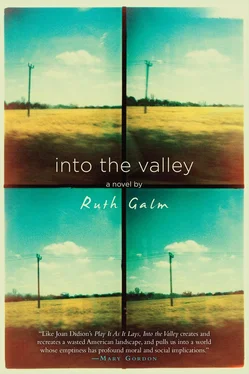And yet, since the encounter, her thoughts had often drifted to this valley. She imagined that in this long unvarying plane, all the contradictions of the city might fall away. That its bareness would reveal something, provide an answer she had failed to acquire. A place of unvarnished truth to which she must go.
Because it was no longer just the dirty young people in the city who disturbed her. In the restroom at I. Magnin recently, she’d encountered a mother and her teenage daughter. The girl with clear breasts and long legs, as tall as the woman. But the daughter was trying to pull her skirt off. “I’m not sure I want to be wearing it all day,” she said. “What if I get cold? What will I do?” The mother hushing and soothing her, keeping the girl’s hands from the skirt while the girl shuddered. B. washed herself quickly, but the mother looked straight at her, voice harried: “She’s only ten. She looks older, but she’s only ten.” B. had nodded and run out.
What she had not thought through were the logistics. She had not considered how in this tabula rasa she would find the banks. This new state of affairs, this new exigency, she did not question. She only knew she would find them.
She had renamed herself “B.” after college. She thought that was the beginning of the problem: she’d never felt like a Beverly, never known what a Beverly should want to do. The singsong syllables and the lift at the end like a promise made without her agreement, disorienting her. So she’d erased it. People heard it as “Bea,” and that was fine with her. As long as she could think of herself as B., something opened up, went blank in a way she could tolerate.
For a time.
The paper sliding across marble. The tellers’ anodyne voices.
Later it was all spoiled. By the glint of the knife, the blood, the expression on Daughtry’s face as she drove away.
But by then it no longer mattered.
“Because you’re a good girl, they’ll like you. Because you look normal and you act normal and you’ve done up your hair and you’ve walked in the right way, with class, you’re gonna fool them blind.
“Because I’ve always told you: you’re a good, classy girl and that won’t ever change.”
The car was low on gas. She had not checked the gauge before leaving the lot and she flushed at the thought of the salesman making a joke of her. (No, she had not wanted a Chevy or a Chrysler. She knew this instinctively, although she might only have been able to say it was the look of the car. Something strong and sharp in the Mustang that pared it down to a single purpose, an inarguable direction. She’d never considered owning a car before. The subways and elevateds in the East had obviated any need, and perhaps, more importantly, owning her own car had seemed somehow unseemly. The women in advertisements lounged around cars in feather boas in the company of tuxedoed dates or carted bags of groceries to the back of a station wagon. And so she had tried to put the thought out of her mind, like some lurid afternoon fantasy, but the empirical beauty of the Mustang had stayed with her, and the car was the first thing she thought of after the check.)
There were no buildings in sight. The July heat made her arms and back sweat, moistening and drying and moistening again. Her left arm turned red in the sun. The city never got hot. Even on the warmest days, she shivered, her toes chilled. She wetted her dry lips and tried to put the anxiety about the gas out of her mind, and when she began to see the first rows of fruit trees, she turned into a dirt lane and parked.
Hundreds of peach trees. She rolled down her stockings and took off the bone-colored heels. The ground was dry and hard, the trees not high but in full leaf, crammed with hard orange peaches. She walked until she found a good spot to sit down. The tree was uncomfortable to lean against and the branches too low, so she lay all the way down on her back and tried to relax. A hot day in her childhood, she had snuck into a vacant lot and lay hidden and cooled in the overgrown grass, among the sounds of cars and birds and cicadas. She’d been convinced of the fact she was erased from the world and breathed easy and fallen asleep. She could not remember another day like that since.
She ate her candy bar, moving her tongue along her teeth for the chocolate and clumps of coconut, and pondered the sky through the peaches. Her throat was dry. She had nothing to drink. It was somewhere after one o’clock on a Tuesday and no cars passed. She tried to keep lying as she had in the vacant lot those years ago but the dirt was hard, and she was not hidden, and eventually she went back to the car and drove on.
She passed a horse corral. No people seemed to be around anywhere. The sun blazed on the animals, their heads bent under the heat, their bodies a liquid brown. They seemed to B., in their unconsciousness, in a state of total equanimity. After the horses came a stretch of dry, uncultivated land and then finally there was a gas station.
She filled up and went to the small bathroom at the back of the building. She saw that the whole back of her dress was dirty. The ivory had not been a wise decision, not for driving or sitting in the dirt, not for the second day of her period. Her underwear had spots of blood where her tampon bled through. She never paid enough attention to when her period might arrive and so was never prepared. And when it did come she seemed, irrationally, to disbelieve that it could require more than one or two tampons. That the blood would run on and on for so many days. She was invariably left with soiled underwear and bloody fingers. She took out the tampon and put another in and folded toilet paper over the blood spots. She went inside the store to pay for her gas, not touching the money in her bra. In her purse was a compact, a gold tube of lipstick, gum wrappers, aspirin, a few crumpled bills, and the checkbook.
A middle-aged woman with bleached hair looked at her blankly from the cash register.
“Do you have a water fountain?” B. asked the woman.
The woman did not acknowledge her question, just put down her magazine and went back behind a gray door and emerged with a paper cup of water.
“You on your way to Reno?” the woman asked.
“No.”
The woman looked annoyed.
“Do you sell maps?” B. asked.
The woman flicked her chin toward the back of the store. B. walked to a revolving rack. She picked up a map of the state. “Do you have anything just for the valley?” she called to the woman.
“The ‘valley’?” The woman frowned. “That’s all we have over there.”
By the time B. returned to the counter the annoyance had set into the woman’s features and she pushed the change toward B. and went back to her magazine without looking up again.
B. laid the map across the passenger seat. Hundreds of black names on pastel. She’d only wanted a small patch to concentrate on, just a piece. She folded the map up. The heat in the car and the smells of hot metal and plastic drugged her. She closed her eyes and leaned her head back against the square seat.
She must have fallen asleep because next the woman from the gas station was rapping at her windshield. “There’s no loitering here,” she said. “Can’t just park all day at the pumps. We got other customers, you know.”
B. rubbed her eyes. The woman glared at her. B. looked around; there were no other cars. “I’m sorry. I guess I was tired.”
The woman crossed her arms, the tanned skin draping.
Читать дальше










